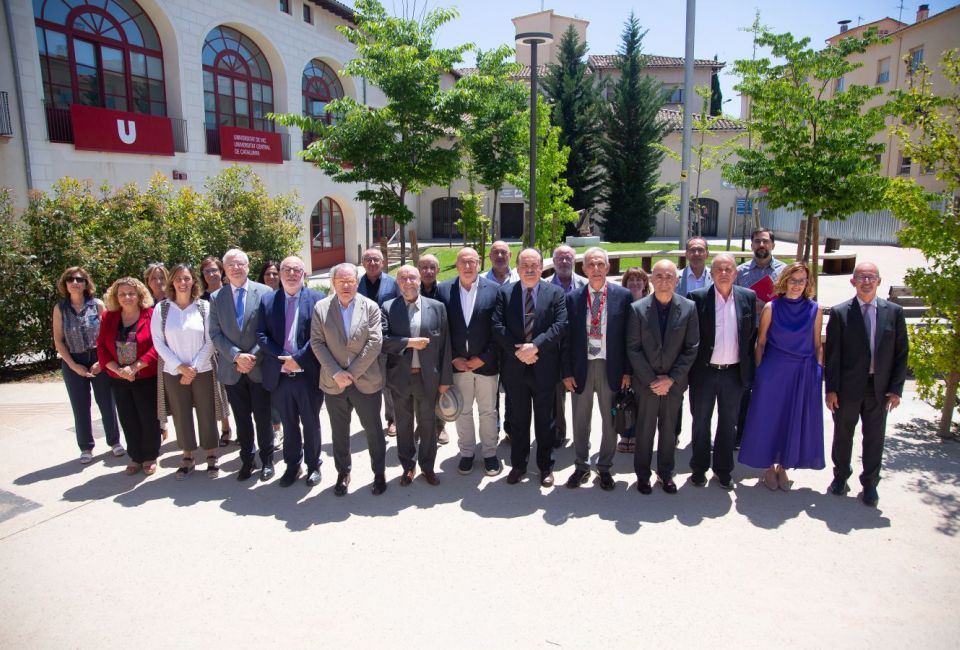
The IRIS-CC begins work with the objective of enhancing health research and innovation in central Catalonia
The Institute for Research and Innovation in Life Sciences and Health in Central Catalonia (IRIS-CC) is now up and running. The Institute's Board of Trustees met on 31 May and it began work in 1 June. More than 300 researchers had already expressed their wish to join when it was established.
Initially established by the University of Vic - Central University of Catalonia (UVic-UCC), the institute consists of 14 academic, health and social institutions in central Catalonia: the Balmes University Foundation, the Bages University Foundation, the Health Sciences Higher Studies Foundation and the Elisava Private Foundation, the University School (all federated within UVic-UCC), the Althaia Foundation, the Central Catalonia Catalan Health Institute, the Hospital Consortium of Vic, the Hospital de la Santa Creu Foundation, the Sant Andreu Salut Private Foundation, the Olot and Garrotxa Regional Hospital Foundation, the Osona Psychopedagogical Private Medical Centre Foundation, the Campdevànol Hospital Private Foundation, the Sant Joan de Déu Hospital of Martorell Foundation and the Vic Primary Healthcare Team, SLP (EBA Vic South). Through its four federated foundations, UVic-UCC has played a role in bringing together the members of the new institute.
The plan for the IRIS-CC was approved by an agreement of the Government of Catalonia on 19 April. The public deed of the founding Charter was subsequently signed on 6 May, and the constituent meeting of the Board of Trustees, chaired by the rector of the UVic-UCC, Josep Eladi Baños, took place on the same day. The director of the Institute will be José Jerónimo Navas, who has accepted responsibility for creating the institute since the beginning of the project. It will initially have 6 people in its management and administrative structure. The research and innovation activities of the founding institutions begin with an initial revenue budget of €1.8 million.
The new biomedical and health research institute was established with the aim of creating scientific knowledge in the fields of life sciences and health. The research lines of the IRIS-CC will initially be those of the founding institutions: biomedicine, clinical medicine (mental health, oncology, digestive system and the locomotor system), epidemiology and public health, ageing-chronicity, care, innovation (in products, health services, simulation, patient safety and teaching innovation), as well as cross-disciplinary topics such as physical activity and sports sciences, data management, design applied to health and well-being, and social and human sciences oriented towards health.
A multicentric perspective, outside the Barcelona metropolitan area
The IRIS-CC is the eleventh biomedical research and innovation institute in health and life sciences in Catalonia. Its establishment strikes a balance in the distribution of research in this region of the country, and increases the opportunities that the area of central Catalonia, a region with a population of 525,000, can offer researchers. One of the distinguishing features of this institute is that it not only includes leading hospitals, but also primary healthcare, socio-health centres, mental health facilities and regional hospitals. Support for research and innovation in health from multiple perspectives (rural, urban, mountain) will contribute to this new institute being distinctive in its analyses and approaches. The IRIS-CC must create knowledge in a multi-centred way, one of the same time attracting, retaining and training talent in the area around its various constituent institutions. The territorial commitment entails having operational and specialist units in the territorial facilities in Vic and Manresa, with Can Baumann as the home of the Faculty of Medicine, and the Althaia Foundation respectively.
The IRIS-CC draws on the resources, scientific background and professionals dedicated to research at the 14 member institutions. As a starting point, in addition to more than 300 researchers who have already expressed their desire to join the institute, fourteen research groups accredited by the Agency for the Management of University and Research Grants (AGAUR) will also join it. This is very significant and unprecedented, because it creates a centre of top-level research activity away from the Barcelona metropolitan area and Catalonia's other provincial capitals. Research and life sciences institutes are always the result of a partnership between the university and healthcare worlds. This is the model that the IRIS-CC has followed, reflecting common practice in Europe and internationally.
Attracting and retaining talent
The existence of the IRIS-CC will facilitate access to new sources of funding for research and innovation by the institutions involved in the future. It is expected to generate new synergies between researchers in the region, to establish partnerships with other leading centres in Catalonia, Spain and internationally, and attract and retain talent in the territory. The research staff will also have access to cutting-edge research structures, some of which are newly established, such as the Clinical Trials Unit (Hospital Sant Joan de Déu de Manresa), the Biobank (Vic University Hospital) and data analysis systems. These resources will enable it to establish new and highly specialised lines of research in key areas for the future, such as protonics, genomics and biostatistics.